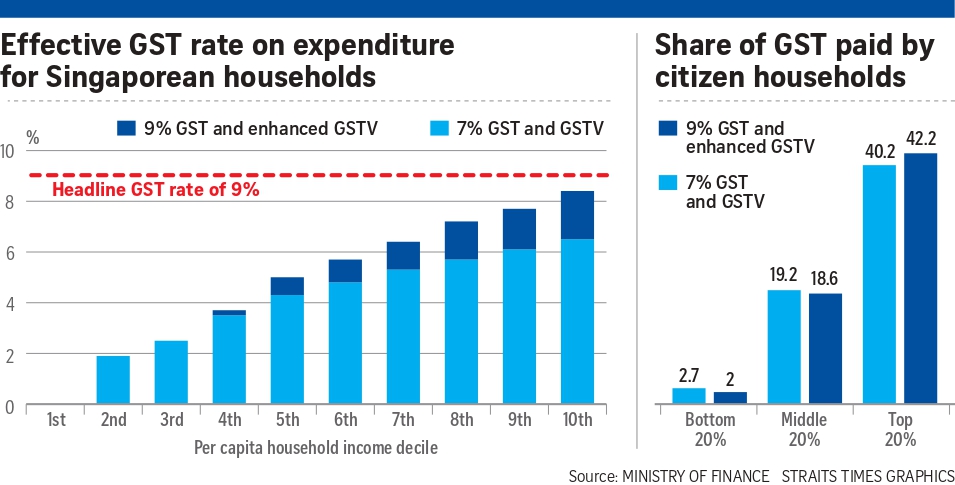Budget debate: Opposition's claims that GST hike disproportionately hurts the poor are misguided, says Lawrence Wong
Sign up now: Get ST's newsletters delivered to your inbox

The GST allows the Government to tax those not earning an income in Singapore, but who are in fact well to do and therefore consume more.
ST PHOTO: KUA CHEE SIONG
Follow topic:
SINGAPORE - Opposition MPs' objections to raising the goods and services tax (GST) rate due to offsets being temporary and because the tax disproportionately impacts the poor are "misguided claims" that ignore the way the GST is implemented in Singapore, said Finance Minister Lawrence Wong on Wednesday (March 2).
With the enhanced GST Voucher scheme, the effective GST rate for the bottom 30 per cent stays unchanged, he said during his round-up speech at the end of three days of debate on the Budget.
"So it is not true that the GST increase hurts the poor - not in the way we have designed it," he said.
In his maiden Budget speech on Feb 18, Mr Wong had announced that the planned two percentage point GST hike would come into force in two phases in 2023 and 2024, at one percentage point each time.
Another effect of the GST results in the well-off carrying a heavier part of the load, said Mr Wong. As a consumption tax, the GST allows the Government to tax those not earning an income in Singapore, but who are in fact well to do and therefore consume more.
"The GST ensures that such people, those who have greater means, will contribute their fair share of taxes."
He added that lower-income households pay a much lower effective GST rate than higher-income households, noting that, on average, households at the bottom 10 per cent - including many retiree households without income - do not pay any GST at all after offsets.
For the next lowest 10 per cent of families, the effective rate is very low, and even for middle-income households, the effective rate is well below the headline 7 per cent rate due to how GST expenses are offset on a continual basis, said Mr Wong.
Non-Constituency MP Leong Mun Wai from the Progress Singapore Party had during the debate said that based on his own calculations, those who are middle-income will bear a disproportionate burden of the GST increase.
Mr Wong said that is not so, as after the GST rate increase, it is the top 20 per cent of citizen households who pay a greater share of GST, after accounting for GST Vouchers and absorbed GST.
Their share of GST goes up from 40 per cent to 42 per cent after the increase, while for the middle 20 per cent of households, their share decreases from 19.2 per cent to 18.6 per cent.
Mr Wong said that is not so, as after the GST rate increase, it is the top 20 per cent of citizen households who pay a greater share of GST, after accounting for GST Vouchers and absorbed GST.
Their share of GST goes up from 40 per cent to 42 per cent after the increase, while for the middle 20 per cent of households, their share decreases from 19.2 per cent to 18.6 per cent.
Timing of the GST hike
The GST rate increase cannot be continually delayed, given the country's pressing revenue needs, and the timing of the hike had been considered very carefully, said Mr Wong.
He said that he fully understood the concerns of inflation and cost of living, which MPs had raised during the debate. Some had asked what would happen if inflation turned out to be higher and more persistent, and if it would be better to wait till after inflation eases to raise the GST.
"If inflation turns out to be persistent and higher than expected, we will deal with this separately through other tools," said Mr Wong, such as through monetary policy and direct help for firms and households.
Apart from managing inflation, Mr Wong on Wednesday also noted that Mr Chong Kee Hiong and Mr Saktiandi Supaat (both Bishan-Toa Payoh GRC) had expressed the need to see local wages rising faster than prices.
Mr Wong said that Singapore had done well on this front in the past 10 years, as median wages in real terms had risen by about 3 per cent a year, faster than other developed jurisdictions such as the United States, Britain, Japan and Hong Kong.
"We will continue to work hard to ensure that such real wage increases are sustained in the coming years across all segments of our workforce," he said.
Mr Wong also said he noted Workers' Party (WP) chairman Sylvia Lim's (Aljunied GRC) suggestion for more diverse and inclusive household archetypes used in Budget materials as examples to show how the measures affect Singaporeans, and that the ministry would bear her points in mind for future illustrations.
On having a tiered GST system
WP MP He Ting Ru (Sengkang GRC) had on Monday suggested making the GST system less regressive by exempting certain essential items from the tax, which some other countries, such as Australia and Japan, do.
Mr Wong said that while it sounds like a good idea, such a tiered system leads to highly arbitrary distinctions between products and a lot of "creative efforts" by businesses to get their products classified into the lower tiers.
"It is administratively costly and onerous to implement... If we were to go down this path, it will significantly and unnecessarily complicate our GST system," he said.
The experience of other jurisdictions is also that such a system does not effectively target support to those with greater needs, said Mr Wong.
"Such an exemption for a basket of goods tends to benefit the well-to-do because they spend more on everything, not just luxury items, but basic necessities as well," he added.
As an example, if GST were to be exempted for uncooked food, basic food services such as hawker centres, foodcourts, and coffee shops, telecommunications services and utilities, there would be an expected loss of about $1.2 billion in tax revenue, according to an exercise conducted by the Ministry of Finance.
Of this, only $185 million - or 15 per cent - of the tax not collected would benefit the bottom 20 per cent of resident households, said Mr Wong.

This is the conclusion of not just the Ministry of Finance, but also other governments and organisations such as the Organisation for Economic Cooperation and Development, said Mr Wong.
"This is why, in fact, it is fairer and more effective, for us to have a single GST rate across the board and to directly help lower-income and middle-income Singaporean families through the GST Voucher (scheme), which is what we are doing," said Mr Wong.
Mr Wong assured Parliament that his ministry had studied and carefully considered every tax option, adding that he appreciated WP MPs' suggestions on alternatives to the GST hike but that there are limitations to the different proposals.
"Every tax move we make is carefully considered. So that we have in the end a balanced, effective and fair set of tax measures in the Budget," he said.
"More importantly, a progressive fiscal system does not and should not mean that each and every tax is progressive, let alone highly progressive. What ultimately matters is the overall system of taxes and transfers to ensure that that overall system is progressive."
He said opposition MPs may think that alternatives such as making the wealthy or large companies pay more in taxes may be politically more attractive, but instead they are "too simplistic and divisive" and will end up creating more problems for society.
He said: "The bottom line is that we cannot sustain a tax system where the bulk or all of the burden is borne by a small group of people at the top end.
"It will not be possible to hold our society together if only a small group of people are required to pay more taxes all the time, while the rest simply get to piggyback on their contributions to enjoy more benefits."
Singapore has designed its tax system based on the principle of collective responsibility, where everyone contributes towards the cost of delivering services, and everyone benefits from these services but to different degrees, he added.
Watch Finance Minister Lawrence Wong's full speech in Parliament:

